Overview
This article delves into the mission statements of various companies that ignite innovation, revealing how these statements embody their core values and inform their business strategies. It brings to light the challenges faced by companies in articulating their purpose clearly. When mission statements lack clarity, it can lead to confusion among customers and hinder brand loyalty.
However, by examining examples from companies like Patagonia, Tesla, and Nike, we see how well-crafted, purpose-driven mission statements can nurture customer loyalty, promote sustainable practices, and strengthen brand identity. These elements are crucial for achieving long-term success in their respective markets.
Ultimately, this exploration serves as a gentle reminder of the power of a clear mission, encouraging companies to embrace their values and connect with their audience on a deeper level.
Introduction
In a world where companies are constantly vying for consumer attention, many founders find themselves facing a daunting challenge: how to stand out in an overcrowded marketplace. The absence of a compelling mission statement can leave brands feeling lost, struggling to connect with their audiences and inspire loyalty. These guiding principles not only define a brand's purpose but also spark innovation and foster meaningful relationships with customers.
By examining the mission statements of ten influential companies, you can uncover how these declarations shape corporate culture, drive sustainable practices, and ultimately influence consumer loyalty.
What valuable lessons can emerging brands draw from these examples to carve out their own unique paths in this increasingly competitive landscape? Together, we can explore these insights and empower your journey forward.
RNO1: Creating Radical Digital Experiences for Modern Brands
In today's fast-paced digital world, many companies struggle to create impactful branding that resonates with their audience. This challenge can lead to feelings of frustration and uncertainty, especially for tech startup founders who are trying to carve out their niche. The implications of not addressing this issue can be significant—lost opportunities, dwindling customer loyalty, and an inability to compete effectively in the market.
At RNO1, we understand these struggles deeply. We are dedicated to crafting that not only redefine branding but also nurture the growth of modern companies. By focusing on innovative solutions tailored to the specific demands of eCommerce and technology, we empower businesses to achieve sustainable growth in an ever-evolving digital landscape. Our commitment to excellence in branding and digital product design—including services like Web & App Development and SEO Strategy & Systems—enhances customer engagement and drives meaningful business results.
One of our proudest achievements is our strategic partnership with Cirkul, which illustrates how our innovative performance marketing strategies elevate eCommerce. Through hyper-scaling solutions, we help companies thrive in competitive markets, ensuring they are equipped to meet the challenges of today’s digital experiences.
As digital interactions become increasingly vital for business success, we stand at the forefront, ready to assist our clients in leveraging the latest trends and technologies. We believe that creating tailored and engaging digital experiences is essential; successful interactions can lead to greater customer loyalty and expanded market share. By focusing on radical digital experiences, RNO1 showcases how transformative narratives can foster long-term success, bringing a sense of community and support to tech startup founders navigating their journeys.
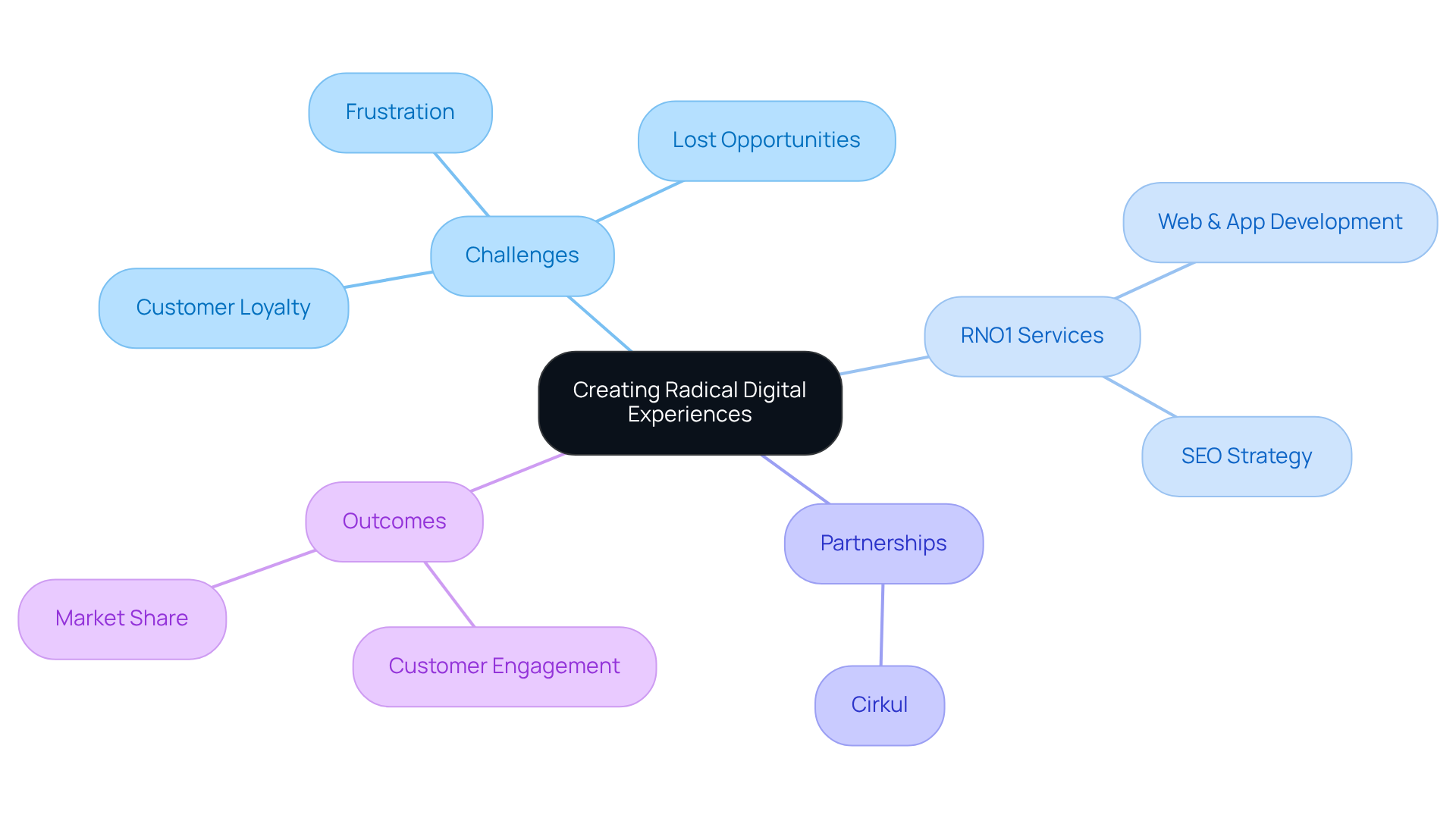
Patagonia: In Business to Save Our Home Planet
Patagonia's mission is clear and heartfelt: 'We're in business to save our home planet.' This profound statement reflects the company's steadfast commitment to environmental conservation and activism, establishing it as a leader in within the outdoor apparel industry. By weaving this mission into its core business strategy, Patagonia not only fosters innovation but also encourages individuals to embrace environmentally conscious choices.
Remarkably, 80% of shoppers express a willingness to pay more for sustainably produced goods, revealing a significant shift in consumer preferences towards companies that prioritize ecological integrity. As Yvon Chouinard, Patagonia's founder, poignantly states, 'How you climb a mountain is more important than reaching the top,' underscoring the significance of the journey toward sustainability.
This alignment of purpose and practice has positioned Patagonia as a guiding light for companies mission statements examples that aim to embed sustainability into their operations. Furthermore, with 85% of individuals acknowledging the impacts of climate change in their daily lives, the demand for companies that actively engage in environmental activism has never been more pressing.
As environmental activism continues to shape brand innovation in 2025, Patagonia's strategy stands as a powerful example among companies mission statements examples of how a clear mission can foster both corporate responsibility and customer loyalty, offering invaluable insights for tech startup founders eager to craft their own meaningful brand narratives.
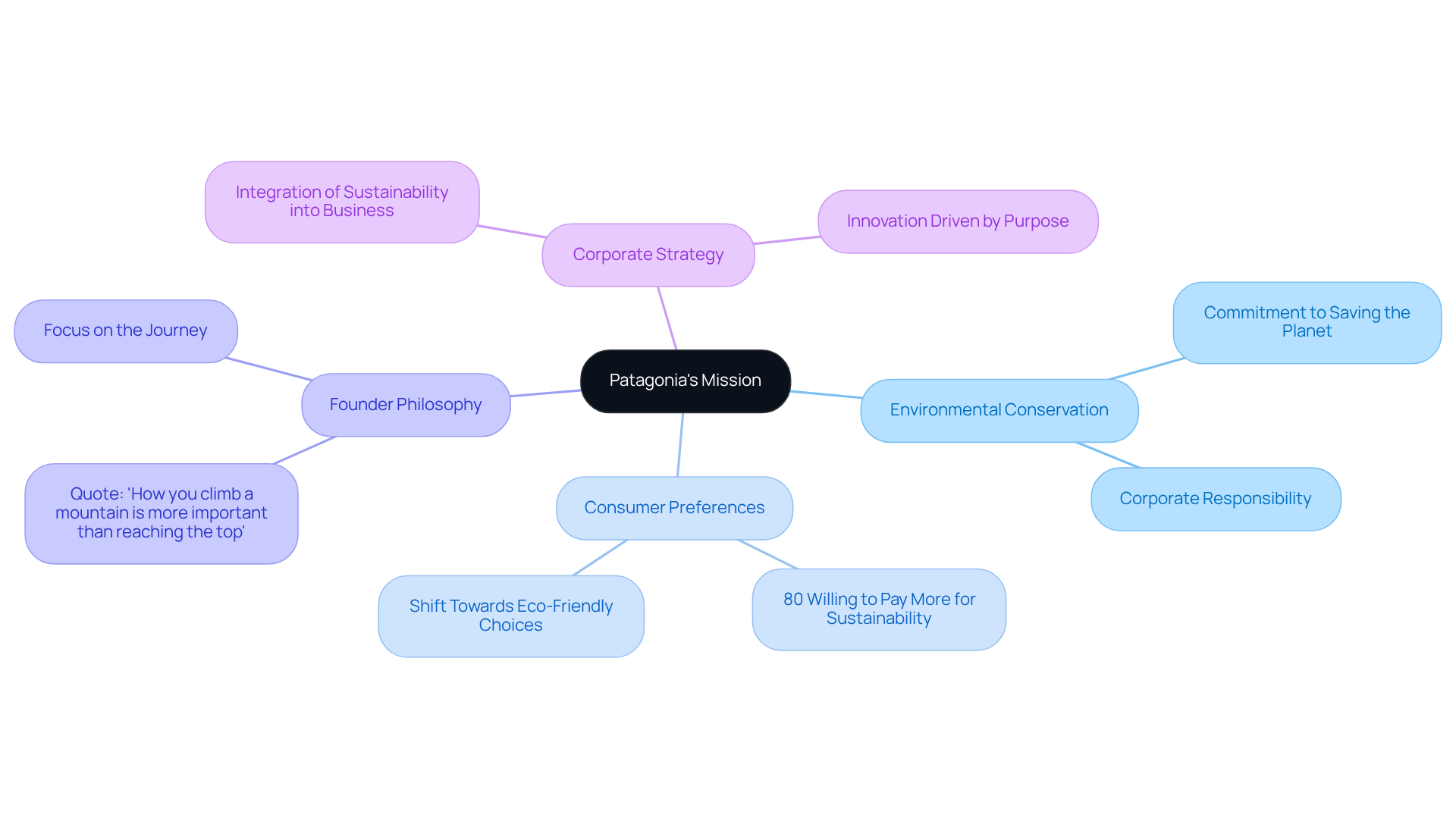
Tesla: Accelerating the World's Transition to Sustainable Energy
Tesla's mission to 'accelerate the world's transition to sustainable energy' highlights a significant challenge we face: the urgent need for innovative solutions to environmental issues. This vision not only positions Tesla as a leader in the electric vehicle sector but also aligns with our collective goals for a healthier planet.
By embracing sustainability, Tesla inspires not just its own innovations but also encourages other companies to reflect on their environmental footprints and to adopt more eco-friendly practices. As more people seek sustainable energy options, the growing demand for electric vehicles reveals a profound shift in market dynamics.
This change emphasizes that sustainability is not merely a trend; it is a vital component of innovation. Businesses are now more than ever compelled to weave eco-conscious practices into their operations, responding to the evolving expectations of consumers and the requirements of regulatory frameworks.
Together, we can , nurturing both our planet and the innovations that will drive us forward.
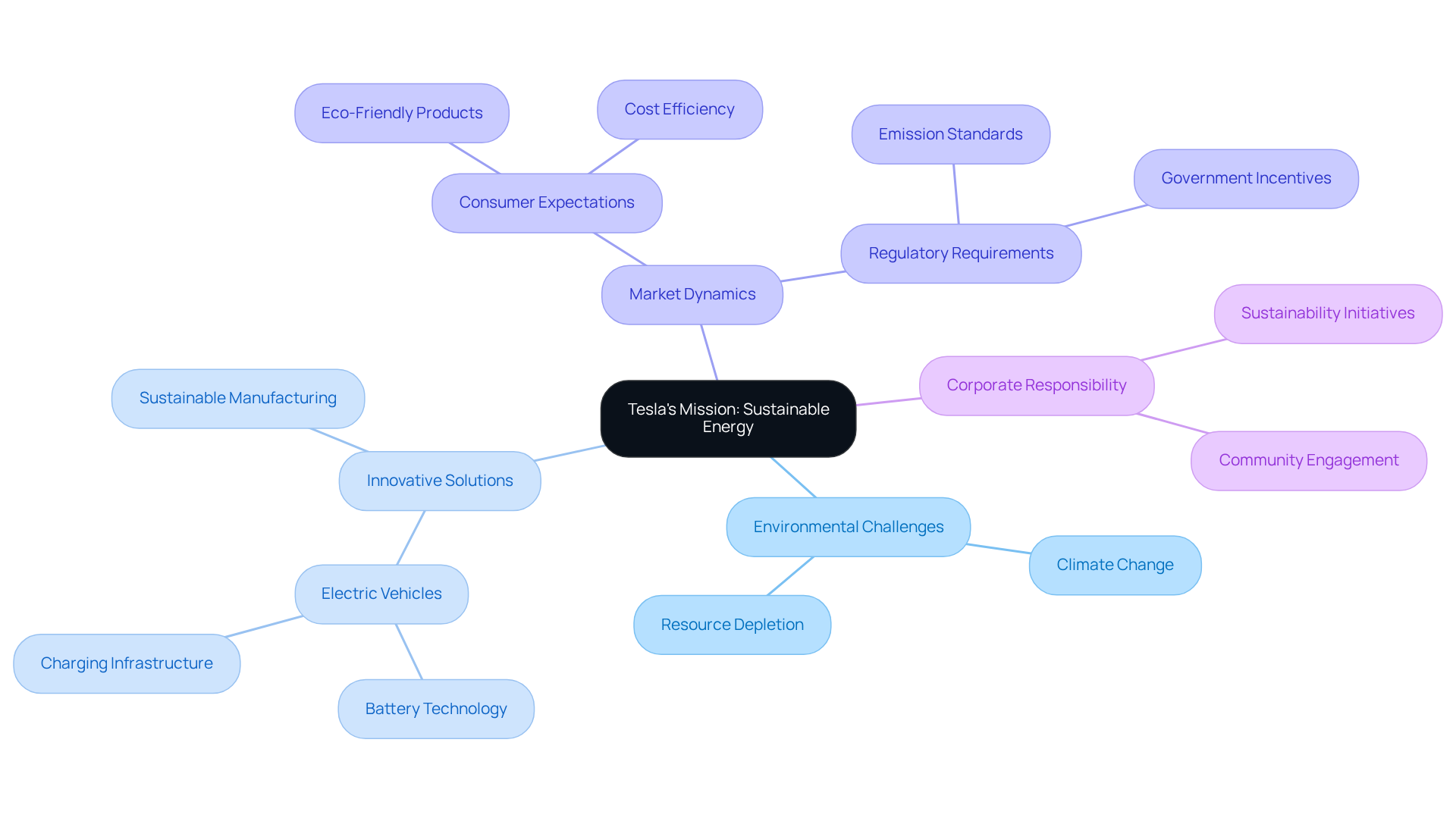
Nike: Bringing Inspiration and Innovation to Every Athlete
Nike's mission is to 'bring inspiration and innovation to every athlete in the world.' This statement reflects a heartfelt dedication to empowering individuals through sports and fitness. In a world where emotional connections matter deeply, Nike seeks to nurture a strong bond with its clients, fostering loyalty and involvement. Research shows that 65% of Gen-Z sports enthusiasts are more inclined to support companies that back their favorite teams, highlighting the critical role of emotional ties in consumer behavior. Furthermore, Nike's inventive approach, characterized by cutting-edge products and thoughtful marketing strategies, not only strengthens its mission but also cultivates long-term commitment among its clientele.
As the fitness landscape evolves, brands that inspire and innovate will continue to thrive. Nike serves as a prime example of how inspirational branding can significantly impact customer loyalty in 2025 and beyond. Quotes like 'Greatness is earned, never awarded' encapsulate Nike's ethos, further solidifying its connection with consumers. In the context of a rapidly expanding online fitness market, Nike's strategy demonstrates how inspirational branding can resonate deeply with audiences, ensuring sustained engagement and commitment. Together, we can embrace the in our journeys, just as Nike does for its community.
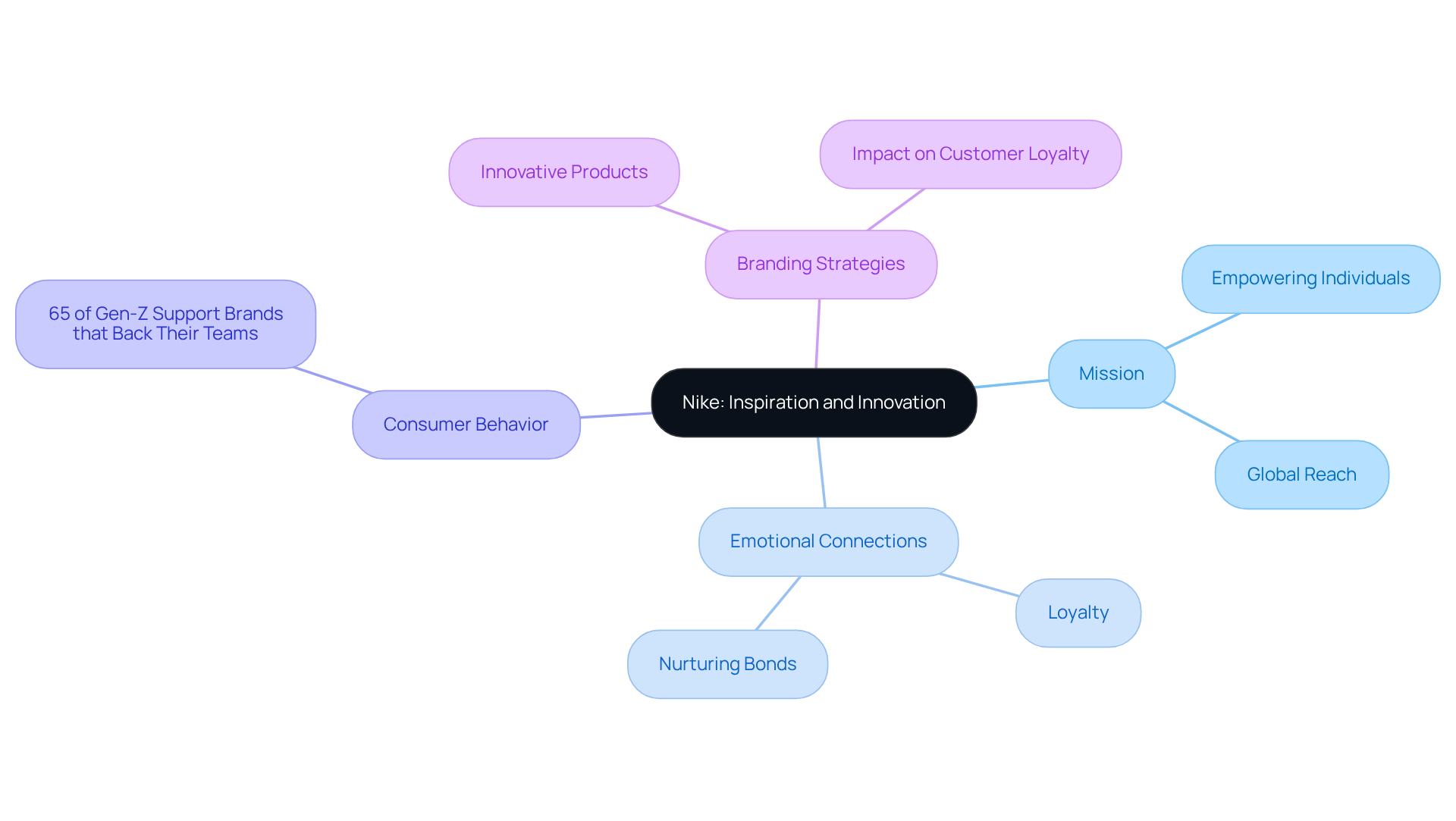
Starbucks: Inspiring and Nurturing the Human Spirit, One Cup at a Time
Starbucks' mission is to 'inspire and nurture the human spirit - one person, one cup, and one neighborhood at a time.' This heartfelt statement reflects the company's commitment to creating a welcoming environment that strengthens community bonds. However, in today’s fast-paced world, many individuals feel disconnected from their communities. This disconnection can lead to a lack of loyalty and support for brands. By emphasizing outstanding client experiences, Starbucks nurtures strong allegiance to its image, encouraging repeat business and fostering a sense of belonging. As customers feel more connected to the organization, their loyalty deepens, resulting in ongoing support.
RNO1's Ryde initiative is a shining example of innovative strategies for scaling omnichannel ambassador programs. It enhances e-commerce engagement through influencer partnerships, which can be a powerful tool for fostering community ties. By leveraging community-driven approaches and influencer marketing, brands can create a similar sense of belonging. Imagine a world where your audience feels truly connected to your brand—this is achievable. Ultimately, fostering deeper connections with your audience can lead to . Let’s explore how we can work together to create that nurturing environment for your brand.
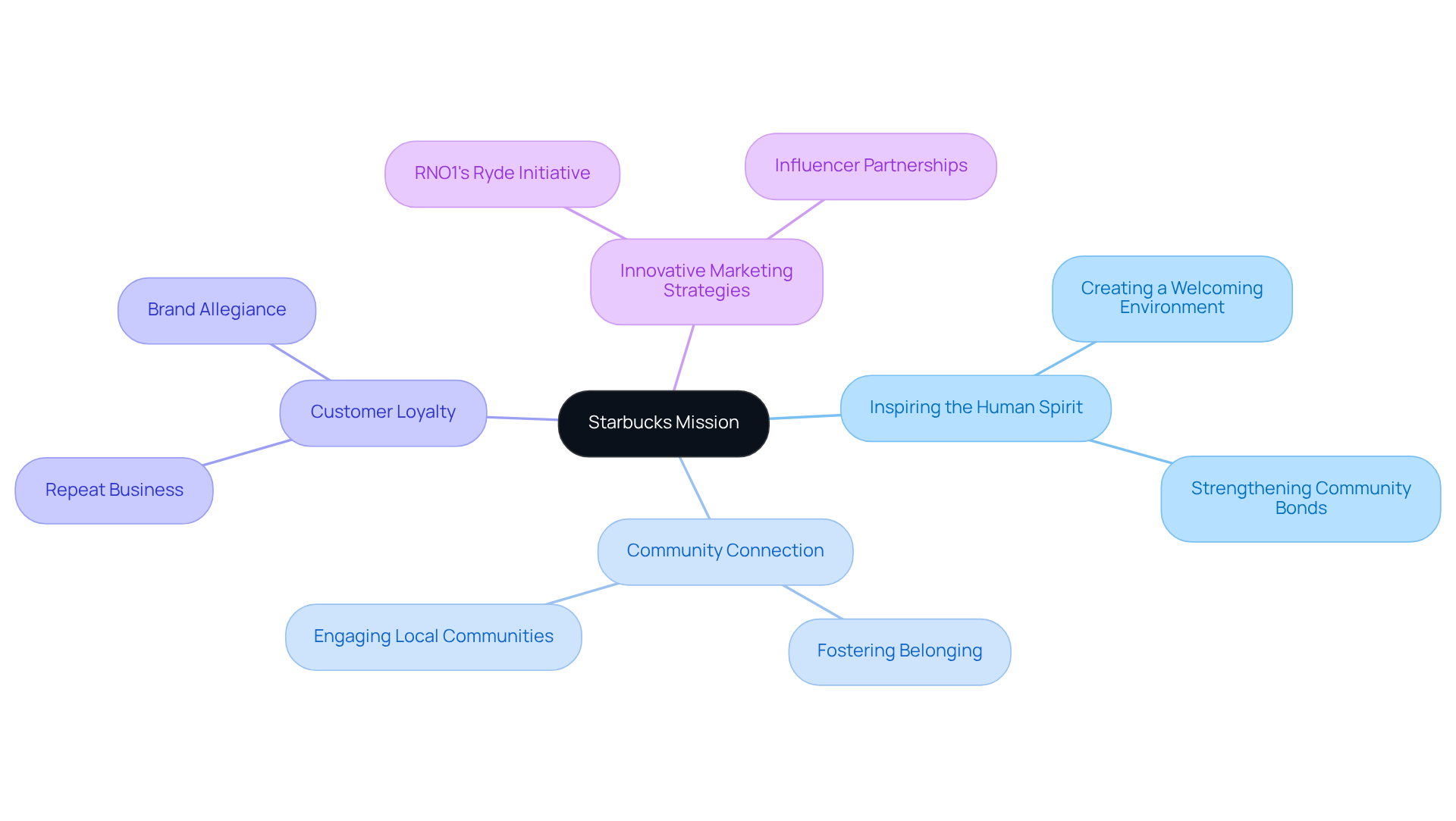
Google: Organizing the World's Information to Make It Universally Accessible
In today's fast-paced digital landscape, many tech startup founders face the daunting challenge of accessing valuable resources that can propel their innovations. This struggle can often feel isolating, as the weight of navigating the complexities of technology and user experience bears down on them. However, there is hope. Just as Google strives to 'organize the world's information and make it universally accessible and useful,' RNO1 embodies a transformative approach that prioritizes design in every interaction. This commitment not only enhances branding but also fosters a nurturing environment for digital growth. By placing design at the forefront, RNO1 positions itself as a collaborative partner, ready to support startups in their journey to innovate and thrive within a competitive landscape. Together, we can create a community where every interaction is , ensuring that founders feel understood and empowered to achieve their dreams.
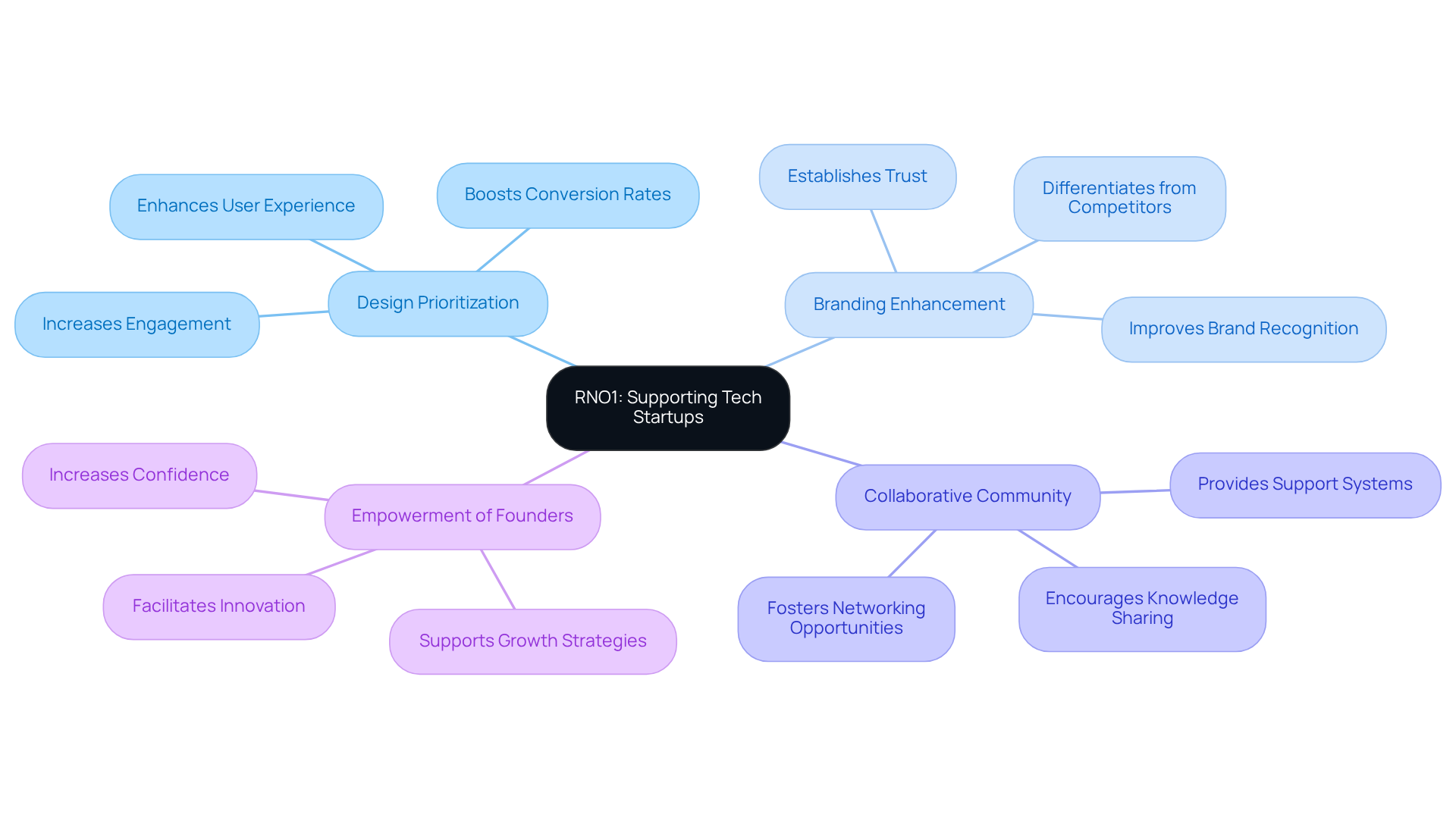
American Express: Becoming Essential to Our Customers' Aspirations
American Express's mission is to 'become essential to our clients' aspirations.' This statement beautifully underscores the company’s dedication to providing exceptional products and services that empower individuals to achieve their goals. However, many companies struggle to maintain this vital connection with their clients, which can lead to feelings of neglect and disappointment. In fact, 41% of Gen Z consumers and 37% of Millennials express a willingness to share their personal interests with companies, seeking a more tailored experience that resonates with their values. This highlights a crucial need for businesses to align with consumer aspirations.
Moreover, the reality is stark: half of devoted clients have left a company for a competitor that felt more relevant to their needs. This underscores the necessity for companies to remain significant in their clients' lives. When businesses successfully forge connections with their clients, the rewards can be substantial; for instance, than new visitors. Furthermore, a significant 61% of consumers indicate that personal benefit is their primary motivation for endorsing a product, reinforcing the link between consumer aspirations and loyalty.
By focusing on these aspirations, American Express not only enhances its reputation but also solidifies its position as a leader in the financial services sector, fostering long-term relationships and customer satisfaction. It's heartening to note that the global customer retention management market is projected to grow from $6.47 billion in 2023 to $28.65 billion by 2030, illustrating the increasing importance of reward programs in nurturing client relationships. Together, we can create a space where aspirations are not just acknowledged but celebrated.
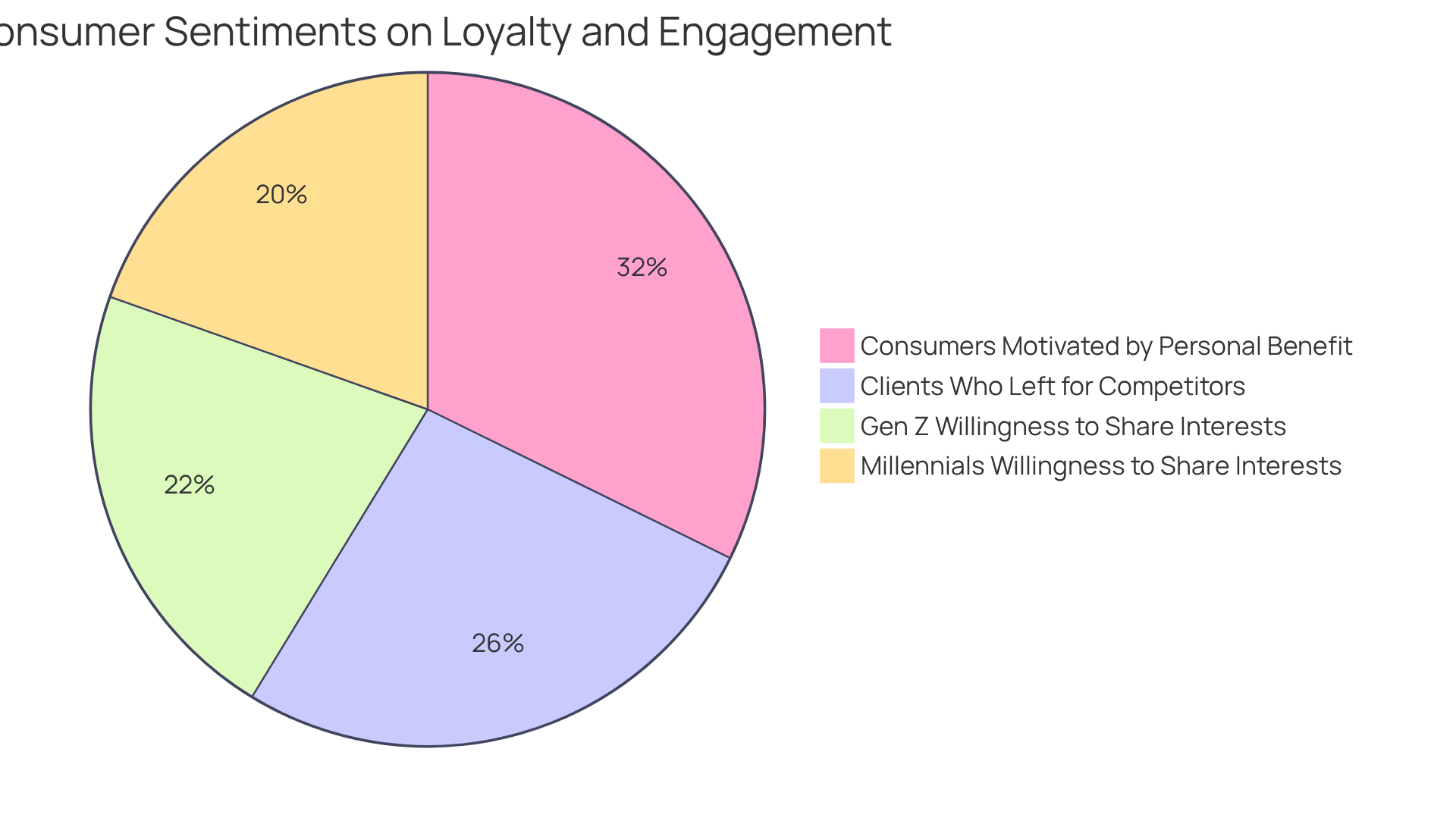
Warby Parker: Inspiring and Impacting the World with Vision and Purpose
Warby Parker is one of the that aims to 'inspire and impact the world with vision, purpose, and style.' This statement not only reflects the company's commitment to social responsibility but also highlights a significant issue: the lack of accessible eyewear for many individuals. This gap can leave people feeling excluded and hinder their ability to engage fully with the world around them.
By incorporating purpose into its business model, Warby Parker exemplifies companies mission statements examples that not only address pressing concerns but also attract socially aware individuals who share a vision for a more inclusive society. This nurturing approach fosters brand loyalty and creates a community where everyone feels valued and understood.
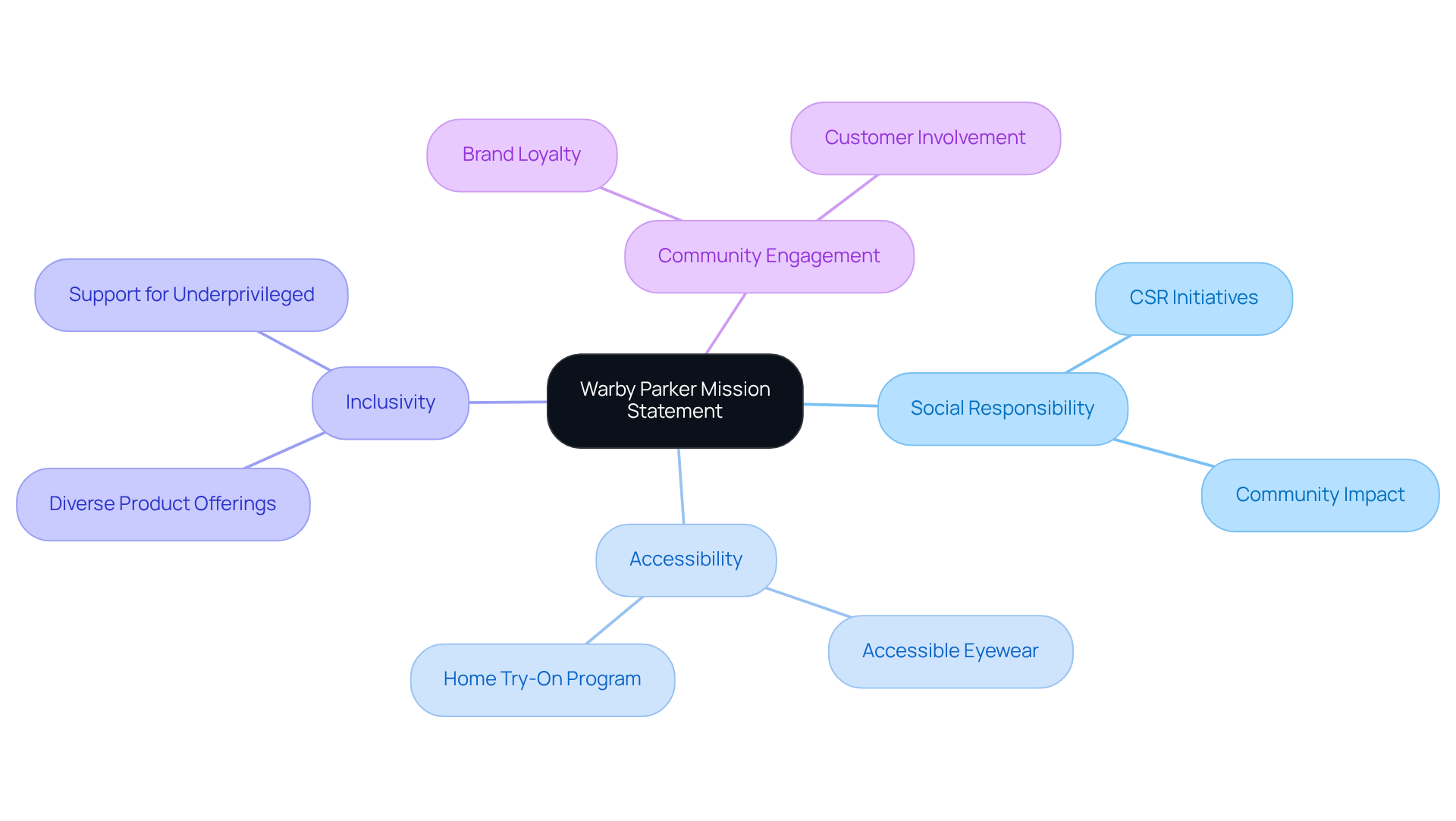
IKEA: Offering Well-Designed, Functional Home Furnishings at Affordable Prices
IKEA's mission, which is to 'offer a wide range of well-designed, functional home furnishing products at prices so low that as many people as possible will be able to afford them,' is often cited as one of the prominent companies mission statements examples. This commitment to accessibility and affordability is vital in influencing buyer purchasing decisions in 2025. The North American home furnishing market, which accounted for a revenue share of 36.67% in 2024, underscores the importance of affordability in a competitive landscape.
Consider the implications: the average yearly spending on furniture per household has surged from USD 355 in 2010 to USD 750 in 2023. This shift indicates a growing willingness to . By focusing on functional design, IKEA not only meets the practical needs of its clients but also enhances their overall shopping experience. This nurturing approach fosters strong loyalty to the brand, as customers are more likely to return to a name that consistently offers high-quality products at reasonable prices.
As a result, IKEA effectively cultivates a loyal clientele that values both the functionality and affordability of its offerings, reinforcing its position as a leader in the home furnishings market. Moreover, with the global home furnishings market projected to reach USD 1480.76 billion by 2033, IKEA's strategy aligns seamlessly with current market trends, ensuring its continued relevance and success. This is a testament to how a caring approach can lead to lasting relationships with customers, making their homes more beautiful and functional without breaking the bank.
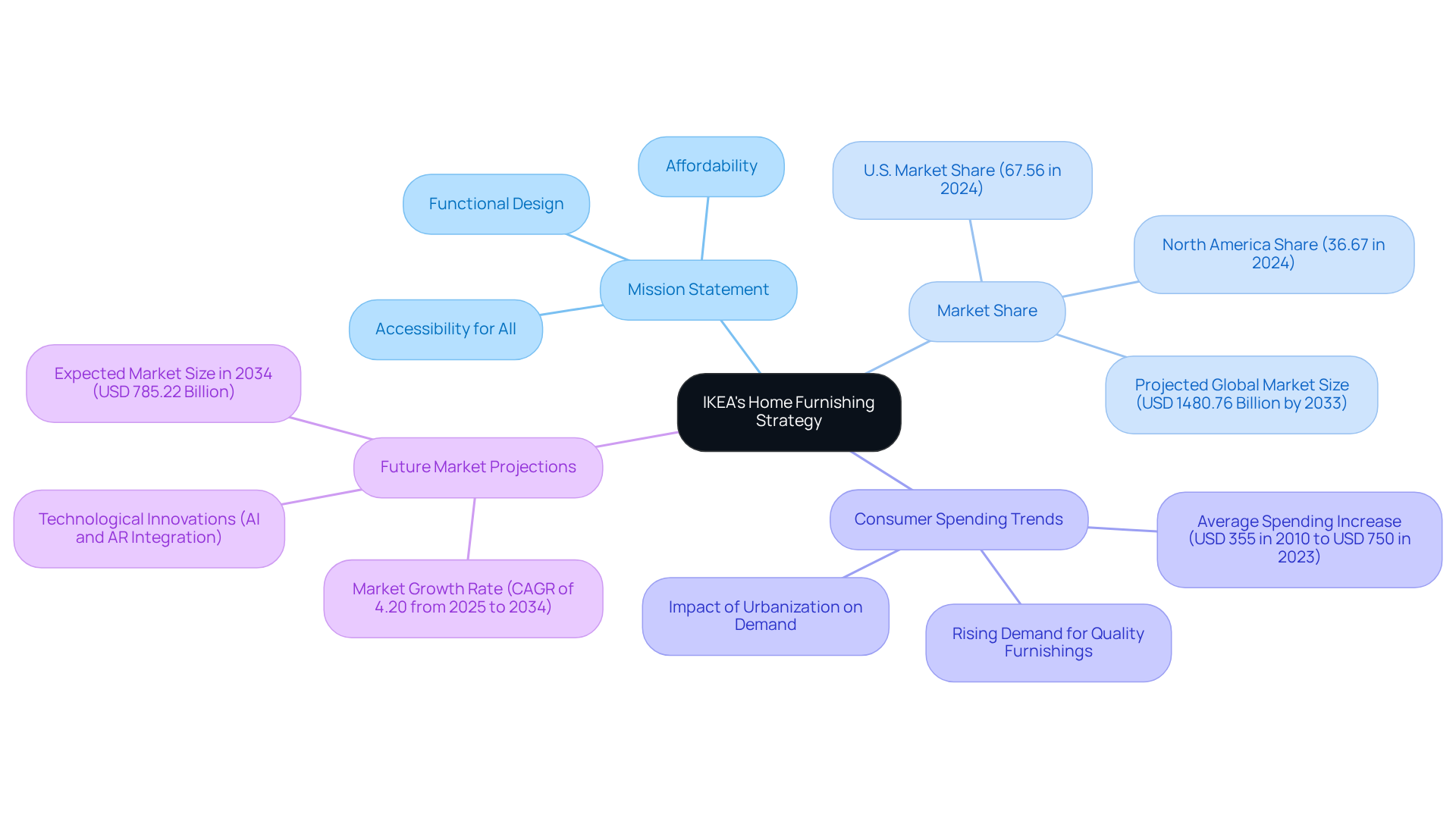
Disney: Entertaining, Informing, and Inspiring People Through Storytelling
Disney's mission is to 'entertain, inform, and inspire people around the globe through the power of unparalleled storytelling.' This commitment to creativity and imagination not only defines Disney's offerings but also cultivates deep emotional connections with its audience. In a world where many feel disconnected, the need for meaningful engagement is stronger than ever.
By emphasizing storytelling, Disney boosts attachment and engagement, as:
- 64% of individuals believe that storytelling assists companies in connecting more effectively with them.
- Brands that successfully convey their narratives can see a 20% rise in customer loyalty.
- 84% of buyers make purchases from brands they emotionally relate to.
Imagine how powerful it is when a brand resonates with you on an emotional level! Disney's approach illustrates how emotional branding can greatly influence audience engagement, making it a potent strategy in 2025 and beyond. Through its narratives, Disney inspires audiences, showcasing the in fostering lasting connections with patrons.
As Cheefoo notes, 'The persuasive power of storytelling is evident, especially among the younger demographic.' Moreover, 92% of consumers want brands to create ads that feel like stories, highlighting the importance of storytelling in modern marketing. This is a call to action for brands to embrace storytelling as a means to connect and inspire.
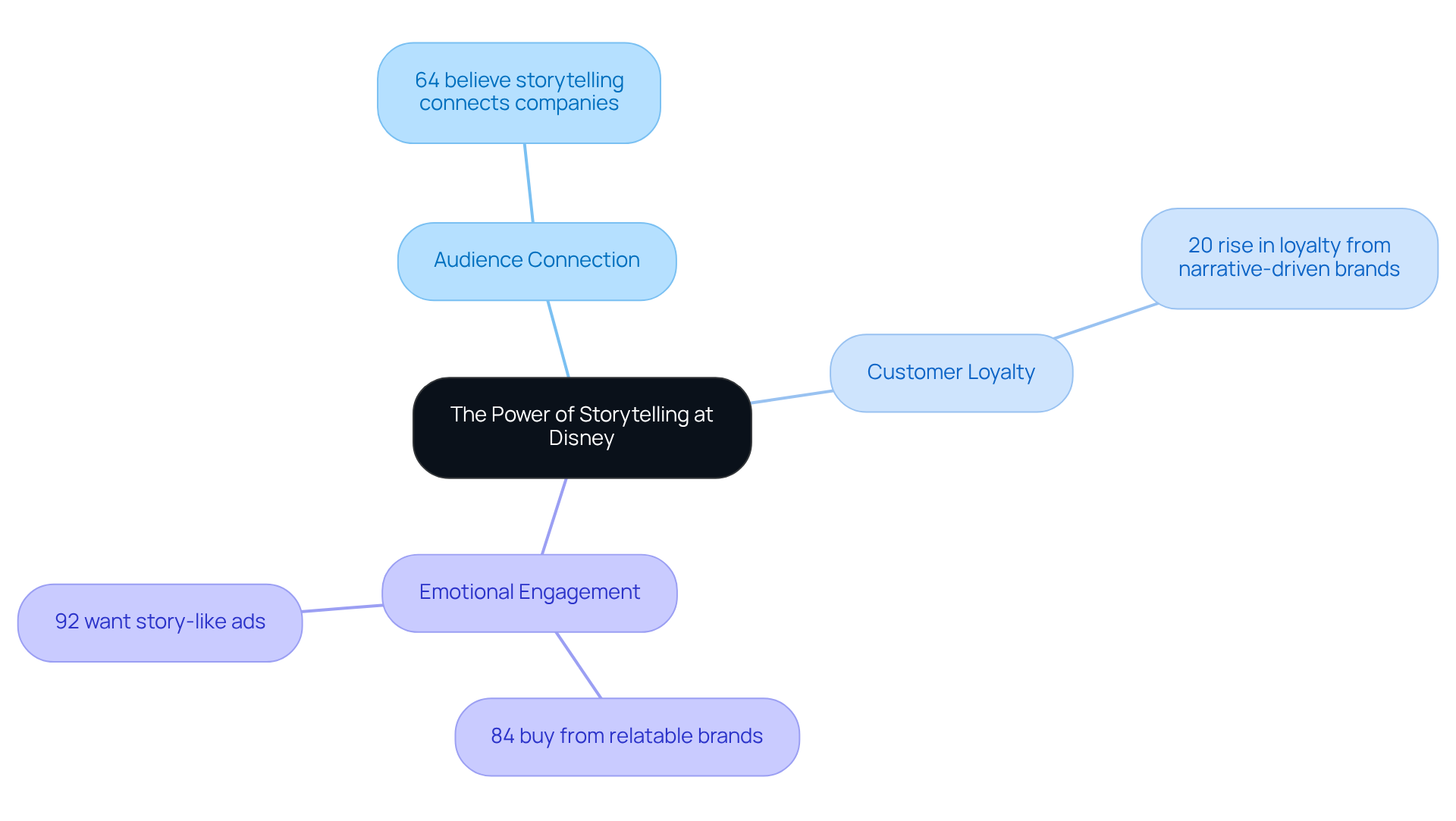
Conclusion
Exploring inspiring mission statements from various companies reveals a common challenge: many organizations struggle to articulate a clear and purposeful vision. This lack of clarity can stifle innovation and weaken corporate culture, leaving both employees and consumers feeling disconnected. However, when a mission is well-defined, it not only guides internal strategies but also resonates deeply with consumers, fostering loyalty and engagement.
Consider RNO1's commitment to crafting radical digital experiences or Patagonia's dedication to environmental conservation. These mission statements act as powerful catalysts for change, demonstrating how aligning business goals with broader societal aspirations can drive market success while inspiring a sense of community among consumers. Companies like Tesla and Nike exemplify this alignment beautifully. Moreover, organizations such as Starbucks, Google, American Express, Warby Parker, IKEA, and Disney showcase the diverse ways mission statements can enhance customer experiences and shape industry standards.
Ultimately, the significance of a compelling mission statement goes beyond branding; it serves as a call to action for businesses to embrace their roles as innovators and community leaders. As we look toward the future, the challenge lies not just in articulating these missions but in living them authentically. By doing so, organizations can forge lasting connections with their audiences, drive meaningful change, and inspire a generation to pursue their visions with purpose and passion. At RNO1, we understand this journey and are here to support you in crafting a mission that resonates, guiding you toward a brighter, more impactful future.
Frequently Asked Questions
What challenges do companies face in creating impactful branding?
Companies often struggle to create branding that resonates with their audience, leading to frustration, lost opportunities, dwindling customer loyalty, and an inability to compete effectively in the market.
What is RNO1's approach to addressing branding challenges?
RNO1 focuses on crafting radical digital experiences that redefine branding and nurture the growth of modern companies through innovative solutions tailored to the demands of eCommerce and technology.
What services does RNO1 offer to enhance branding and digital product design?
RNO1 offers services such as Web & App Development and SEO Strategy & Systems to enhance customer engagement and drive meaningful business results.
How does RNO1 help companies thrive in competitive markets?
Through strategic partnerships and innovative performance marketing strategies, RNO1 provides hyper-scaling solutions that equip companies to meet the challenges of today’s digital experiences.
What is Patagonia's core mission?
Patagonia's mission is to 'save our home planet,' reflecting its commitment to environmental conservation and activism within the outdoor apparel industry.
How do consumers feel about sustainably produced goods?
80% of shoppers express a willingness to pay more for sustainably produced goods, indicating a significant shift towards companies that prioritize ecological integrity.
What insights can tech startup founders gain from Patagonia's strategy?
Patagonia's alignment of purpose and practice demonstrates how a clear mission can foster corporate responsibility and customer loyalty, offering valuable lessons for tech startup founders in crafting meaningful brand narratives.
What is Tesla's mission, and what challenge does it address?
Tesla's mission is to 'accelerate the world's transition to sustainable energy,' addressing the urgent need for innovative solutions to environmental issues.
How does Tesla influence other companies regarding sustainability?
By embracing sustainability, Tesla inspires other companies to reflect on their environmental footprints and adopt more eco-friendly practices, highlighting that sustainability is a vital component of innovation.
Why is sustainability considered essential for businesses today?
Sustainability is essential as it responds to evolving consumer expectations and regulatory requirements, emphasizing that it is not merely a trend but a necessary aspect of modern business operations.




